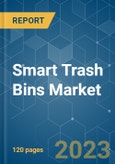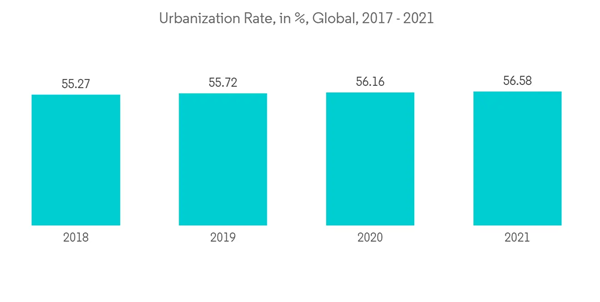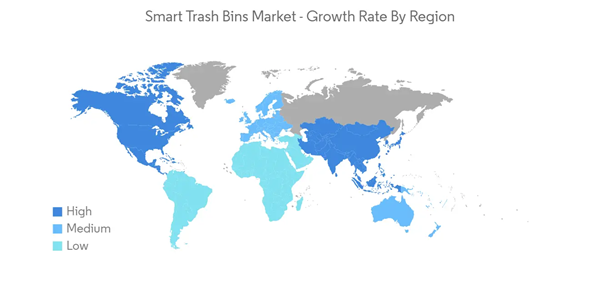Key Highlights
- The amount of waste produced each year is greatly influenced by the rapid industrialization and urbanisation taking place in various parts of the world. According to the World Bank, about 2.01 billion tonnes of municipal solid waste is generated annually, with about 33% of that not being managed in an environmentally safe manner. As these waste materials create several environmental and health issues, the demand for effective waste management solutions has been increasing lately.
- The traditional ways of managing waste are no longer effective, considering the amount of workforce and time required. Many organizations have now started looking for innovative solutions to track and manage waste, creating a good market scenario for the growth of the studied market.
- Due to such trends and future market opportunities in this sector, several technology providers have started developing innovative solutions such as sensors, radio-frequency identification (RFID) tags, and analytical platforms to help the waste management industry stakeholders effectively carry out waste collection, processing, and disposal.
- Taking into account the essential procedures associated with waste management, smart trash bins are gaining significant popularity as they can provide various functionalities such as identification of the type of waste, their location, fill level of bins, temperature, etc., all at a single platform which a user can even access remotely, hence, making the waste management process smoother and effective.
- However, the factors such as low awareness, especially among the developing regions, along with lack of supporting infrastructure and the high cost involved bot in installing and managing smart bin infrastructure are among the major factors challenging the growth of the studied market.
- The global outbreak of COVID-19 has had a notable impact on the studied market's growth as increased awareness about maintaining hygiene and cleanliness in the surroundings increased demand for smart trash bins, especially in the residential and healthcare segment, as many organizations and individuals installed mask disposable smart trash bins. As a result of these trends, consumers' purchasing patterns are changing consistently, which is likely to have a beneficial long-term impact on the industry under study.
Smart Trash Bins Market Trends
Growing Urbanization & Investment in Smart City Infrastructure to Drive the Market's Growth
- Over the years, urbanization has increased significantly across the globe. For instance, according to the World Bank, in 2021, about 5% of the global population stayed in urban areas. Urbanization directly correlates with waste generation, owing to the higher consumption rate of packaged or processed products.
- Urbanization is having a higher impact in developing regions than in developed regions. In developing regions, a significant portion of the waste is openly dumped, owing to a lack of awareness and required infrastructure. For instance, the World Bank predicts that by2050, total waste generation in the fastest-growing countries, such as Sub-Saharan Africa, South Asia, the Middle East, and North Africa, will have more than doubled. Considering the vast implications that openly dumped waste can have for the environment, the demand for innovative waste management solutions such as smart trash bins is expected to grow across these regions.
- Recent years have witnessed significant growth in smart city infrastructure investment. Governments, especially across emerging and developing countries, are making significant investments in developing smart city infrastructure. For instance, under Under Union Budget 2021-22, the Smart Cities Mission in India has been allocated INR 6,450 crore (USD 868 million) as compared to INR 3,400 crore (USD 457 million) in FY21.
- As smart cities primarily focus on adopting advanced digital technologies, increasing investments are expected to create a supportive market scenario for the growth of the smart trash bins market during the forecast period.
North America to Hold Significant Market Share
- The North American region is expected to hold a significant market share of the global smart trash bins market as the region has a higher percentage of the population staying in urban areas. Additionally, increased consumer and organizational awareness as well as greater use of new technologies are the main drivers of the market's expansion. Furthermore, the presence of many technology companies offering services to smart trash bin providers is also contributing to the market's growth in the region.
- The concept of smart cities and efficient waste management solutions in the North American region is increasing. While touchless trash cans provide comfort while preventing germ cross-contamination, Wi-Fi-enabled devices and the Internet of Things (IoT) are becoming more popular. Hence, the increasing investment in smart cities is expected to drive the region's demand for smart trash bins.
- For instance, in August 2022, San Fransisco state officials announced their plans to replace about 3000 old trash cans with smart trash cans. The new smart trash cans include features such as a QR codes so that people can answer questions related to individual cans. Furthermore, the city has also created interactive maps for residents to track and test the different trash can designs.
- Similarly, other major cities are also making efforts to make the waste collection, treatment, and disposal process smooth and highly efficient. For instance, Ste-Anne-de Bellevue, a small Canadian city in March 2022, announced its plans to adopt a smart garbage collection system. Such trends are expected to support the growth of the studied market during the forecast period.
Smart Trash Bins Market Competitor Analysis
The smart trash bins market is growing in competition as increasing awareness, and growing adoption of these bins are encouraging new players to enter the market. As the market is technology-intensive, vendors are highly focused on developing innovative solutions and adding new functionality to their offerings to achieve market differentiation. Partnerships, mergers, and acquisitions are also among the key strategies adopted by the vendors to expand their market presence further.In September 2022, Romanian city of Brasov announced its plans to replace every garbage bin with a 'Smart' recycling alternative. The announcement aligns with the Romanian Plan for National Recovery and Resilience. The city, which already operates such systems, plans to purchase 275 more such smart systems, which will cost around EUR 6 million.
In April 2022, North Inc., a leading IoT service provider, was selected to provide sensors for waste containers throughout Edinburgh as part of the city's smart city project. The project will see North provision about 11,000 smart sensors in waste containers throughout the city to enable the city council to optimize collection and manage routes more efficiently.
Additional benefits of purchasing the report:
- The market estimate (ME) sheet in Excel format
- 3 months of analyst support
This product will be delivered within 2 business days.
Table of Contents
Companies Mentioned (Partial List)
A selection of companies mentioned in this report includes, but is not limited to:
- CleanRobotics
- Ausko Pte Ltd
- Evreka
- Enevo Inc.
- iTouchless Housewares and Products Inc.
- Sensoneo
- Bine sp. z o. o.
- Hangzhou Bosheen Household Technology Co.,Ltd.
- Euronics Industries Pvt Ltd
- Sehaj Synergy Technologies Pvt. Ltd.










